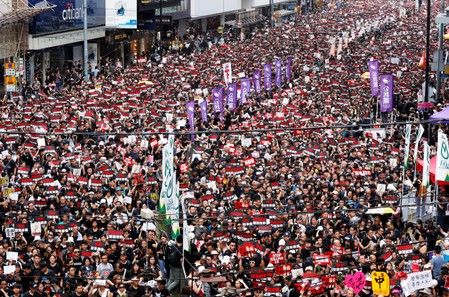
In times when parts of Asia and Africa are facing, directly or indirectly, with wars, uncontrolled immigration, dislocation and ruthless ideological extremism, Hong Kong has long beckoned as an oasis of stability even under the shadow of communist dragon, the People’s Republic of China.
Hong Kong which is closer to China- geographically, in terms of prosperity, development, investment and tons of opportunity yet far enough of Xi Jinping’s authoritarian policies which has helped it to be a base for investors who are capitalizing on China’s development.
Hong Kong was ruled by British till the dusk of the tumultuous 20th century, ending in 1997. The UK government in a deal with China agreed upon giving Hong Kong an Semi-autonomous status of ‘Special Administrative Region’ for the next 50 years ending 2047. Under this status the state is promised a separate police force, flag and unique set of laws promising free press and freedom of speech and expression as if it were a chapter from the ‘Western civilization’ which China doesn’t agree to.
It has served as a bridge between two rival powers nursing mutual suspicions, the United States and China. It is Chinese territory yet governed by a legal system inherited from the West, and intertwined with the global financial system.
Controversial Extradition Bill: A Trigger
Taiwan, another controversial independent territory which is not a part of China, faced a situation where a murder suspect was tracked down to Hong Kong but were not able to gain the custody as there’s no formal treaty for ‘extradition of criminals’. This led to the introduction of controversial extradition bill under which a person accused of crime can be deported to mainland China. The move sent chills down the foreign businesses and the stock market with questions over autonomy beginning to resurface.
The introduction of bill was followed by huge protests over following weekends paralyzing traffic, tourism and the crucial airport of the city. Markets began to cr ash and businesses downed the shutters following pressure from pro-democracy protesters and pro-China counter protesters.
The introduction of the bill caused widespread criticism and fears domestically and abroad from the rights groups including Amnesty International, international media organisations, business groups, and foreign governments fearing the erosion of Hong Kong’s legal system, its built-in safeguards for its residents, as well as damage to Hong Kong’s thriving investment and a loss of reputation of safe haven from China’s Communist Party. Largely, this fear is attributed to clause in the bill that proposes to allow
to arrest voices of political opinions opposing China in Hong Kong and sending them back to the mainland.
The protests which started off with a few thousand then swelled to a million when protesters marched in the streets and called for Chief Executive Carrie Lam to step down along with four other demands.
Hong Kong protests soon spread to campuses of foreign universities, especially the US, creating a rift between pro and anti China students both of whom form a huge pool of foreign students for foreign universities and no such move was taken in large by any host country that could upset China or hinder it’s business.
After weeks of protests on 15 June, leader Carrie Lam eventually said the bill would be suspended indefinitely. Protests continued as protesters feared the bill could be revived calling for the bill to be withdrawn completely.
On 4 September, after 13 weeks of protests, Lam officially promised to withdraw the bill and subsequently on 23 October after resumption of legislative assembly John Lee Ka-chiu, Hong Kong’s Secretary for Security, announced the government’s formal withdrawal of the bill.
Till day the protests continue for demands other than withdrawal of bill such as leader Carrie Lam to step down, an inquiry into police brutality, for those who have been arrested to be released, and greater democratic freedoms.
The Beijing’s tone continues to intensity while accusing the United States of America and it’s leaders including President Trump and opposition Democratic Party of fueling and funding unrest who had condemned the Hong Kong’s police brutality and Beijing’s threats in strong terms and unequivocal voice.
There’s no end to this protests in the near future and whether People’s Liberation Army of China’s Communist Party sets their foot on the Hong Kong soil is to be seen. If so, the downfall of city’s falling economy and looming tourism has no near relief.
